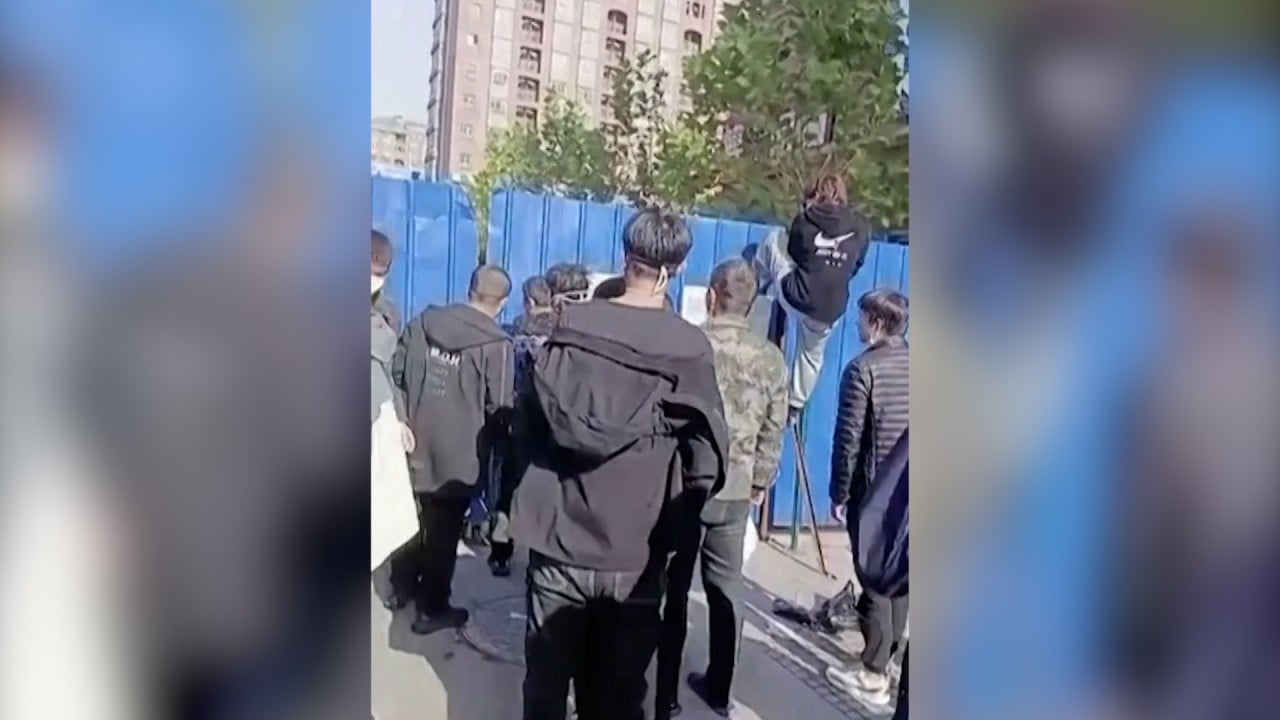
01:51
Violence erupts at world’s largest iPhone factory over benefits and Covid-19 controls

China’s daily Covid-19 infections have jumped to a record high as local authorities scramble to contain expanding outbreaks while balancing their response against a central government order not to impose excessive measures.
The National Health Commission reported 31,444 local infections on Thursday morning, including 27,517 who are yet to show symptoms. The case count exceeded the previous peak in mid-April when Shanghai was under hard lockdown and more than 29,000 local infections were reported nationwide.
The new wave of Covid-19 infections came after the top party leadership tweaked its stringent zero-Covid policy by cutting quarantine time, allowing more inbound travellers and tracing fewer people to lessen disruption to the economy and society.
The 20-point measures, introduced two weeks ago amid a growing coronavirus wave, and the national health authority’s announcement it would build more hospitals, including more intensive care beds, highlighted how the leadership had prepared to tolerate bigger Covid-19 waves.
However, local authorities are left with a difficult balancing act: trying to achieve both “dynamic zero” – cutting each chain of transmission rather than achieving zero Covid infections – while trying to implement the new 20-point playbook, for example by avoiding citywide testing and lockdowns.
Zhengzhou in central Henan province became the first city in China to announce a major lockdown after the new measures were introduced. The municipal government said late on Wednesday night that a five-day plan to “control the movement” – a euphemism for lockdown – would start in its urban districts on Friday.
The city reported 674 local infections on Thursday, down from 827 a day earlier. It recorded nearly 3,000 cases about two weeks ago.
Zhengzhou was previously criticised by a State Council Covid-19 response mechanism for using blanket shutdowns instead of more targeted measures to curb the spread. The government apologised and said it would rectify itself.
The announcement of its lockdown came hours after workers at Foxconn Technology Group, Apple’s largest assembly line in Asia and a major taxpayer in the city, staged two protests over hygiene and unpaid bonuses.
Unverified videos on social media showed hundreds of workers pushing past the outnumbered guards, overturning barriers and physically clashing with people in white protective suites.
The northern city of Shijiazhuang was one of the first cities to answer the government’s call to ease measures by cancelling and closing testing booths, but had to back-pedal and reintroduce mass testing and lockdowns after a week of mixed reactions from the public and a resurgence in daily cases
Across China, several major cities have tightened Covid-19 restrictions in response to the surge in cases.
From Thursday, the capital Beijing cut the time required to travel and enter public places after giving a valid negative PCR test from 72 hours to 48 hours. Parks, museums and shopping malls have been closed and residents are urged to stay at home.
The city reported 1,648 local infections on Thursday, including 328 found outside quarantine, indicating the virus is widespread in the community.
Beijing has not imposed a hard lockdown but more buildings and residential areas have been sealed off because of Covid-19 cases. On Wednesday, Chaoyang district, the worst-hit area in the capital, closed hundreds of residential areas for three days to curb the spread of the virus.
Residents have started to stockpile food and medicine as more buildings were put under lockdown, but Yang Beibei, deputy head of Chaoyang district, told a briefing on Thursday afternoon that “the supplies for essential items are ample and residents do not need to go overboard stockpiling”.
A makeshift hospital for mild cases, converted from a large exhibition centre in northern Beijing, has been in use since Wednesday. Posts on social media – later censored – showed chaotic scenes of people looking to gain admission or get food and other supplies.
The southern manufacturing hub of Guangzhou – where 8,837 infections were reported on Thursday – plans to add nearly 350,000 beds to accommodate patients. Some 70,000 of the beds have already been filled.